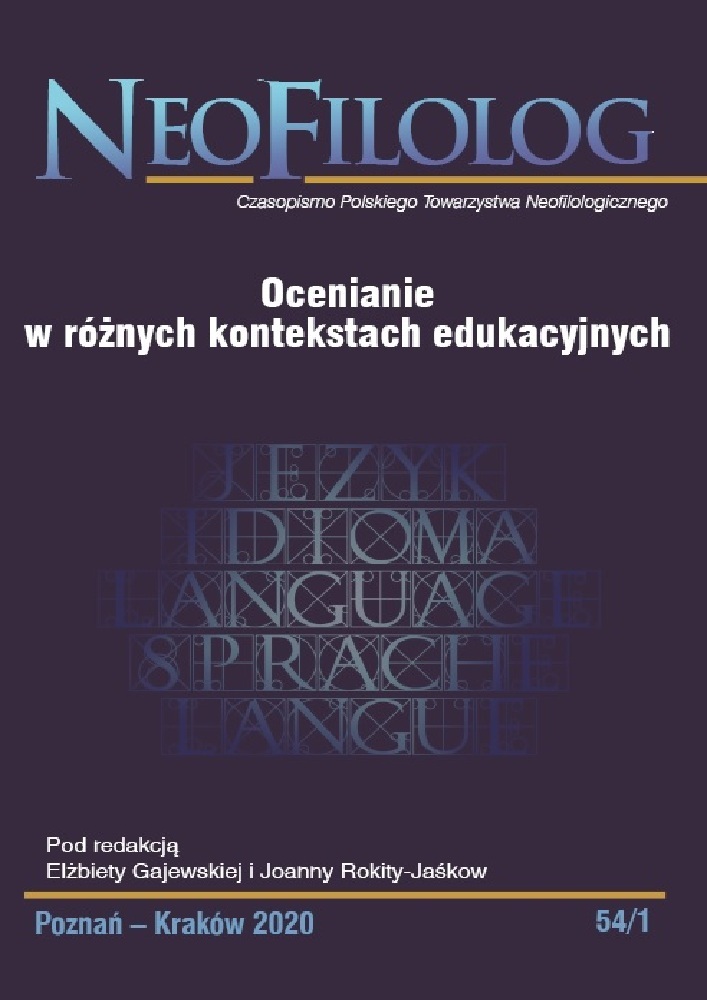Abstrakt
The article introduces formative assessment as one of the most powerful factors influencing students’ achievements and presents its significance for process-oriented learning and teaching. Due to its importance formative assessment should be an inherent part of the pre-service teacher training program. The aim of the present paper is to highlight the potential of peer-to-peer-feedback, as a part of formative assessment, for enhancing the assessment competence of pre-service teachers. The results of the study presented in the article suggest ways in which peer-to-peer feedback can be used to foster the assessment competence of prospective teachers.
Bibliografia
Al-Khamisy D. (2013), Edukacja włączająca edukacją dialogu. W poszukiwaniu modelu edukacji dla ucznia ze specjalnymi potrzebami edukacyjnymi. Warszawa: Wydawnictwo Akademii Pedagogiki Specjalnej.
Bohl T. (2004), Prüfen und Bewerten im Offenen Unterricht. Weinheim und Basel: Beltz Verlag.
Bortz J., Döring N. (2003), Forschungsmethoden und Evaluation für Human- und Sozialwissenschaftler. Berlin – Heidelberg – New York: Springer.
Czaplikowska R., Kubacki D. (2019), Kleines Fachlexikon der DaF-Didaktik. Theorie und Unterrichtspraxis. Chrzanów, Kraków: Kubart.
Hattie J. (2015), Widoczne uczenie się dla nauczycieli. Jak maksymalizować siłę oddziaływania na uczenie się. Warszawa: Centrum Edukacji Obywatelskiej.
Hattie J., Timperley H. (2007), The power of feedback. „Review of Educational Research”, Nr. 1(77), S. 81–112. Online: https://ctl.univie.ac.at/fileadmin/user_upload/z_ctl/Feedback/Hattie_Timperley_2007_Power_of_Feedback_1_.pdf [abgerufen am 18.03.2017].
Janicka M. (2017), Umgang mit Diversität im Klassenraum – Annahmen und Realität. „Glottodidactica”, Vol. XLIV/1(2017), S. 9–21.
Janicka M. (2016), Nauczyciele języków obcych wobec różnorodności w klasie językowej oraz wyzwań dydaktyki włączającej. „Języki Obce w Szkole”, Nr 4, S. 39–46.
Komorowska H. (2018), Feedback in language learning and teaching. „Glottodidactica”, Vol. XLV/2(2018), S. 185–199.
Kordziński J. (2013), Nauczyciel, trener, coach. Warszawa: ABC. Wolters Kluwer Business.
Reich K. (2004), Konstruktivistische Didaktik. Lehren und Lernen aus interaktio¬nistischer Sicht. München, Unterschleißheim: Luchterhand.
Reich K. (2014), Inklusive Didaktik. Bausteine für eine inklusive Schule. Weinheim und Basel: Beltz Verlag.
Siebert H. (2005), Pädagogischer Konstruktivismus. Lernzentrierte Pädagogik in Schule und Erwachsenenbildung. Weinheim und Basel: Beltz Verlag.
Sterna D. (2016), Uczę się uczyć. Ocenianie kształtujące w praktyce. Warszawa: Centrum Edukacji Obywatelskiej.
Ziebell B. (2007), Unterrichtsbeobachtung und Lehrerverhalten. Fernstudieneinheit 32. Videosequenzen. Berlin: Langenscheidt.
INTERNETQUELLEN
http://prawo.sejm.gov.pl/isap.nsf/download.xsp/WDU20120000131/O/D20120131.pdf [abgerufen am 08.10.2019]
http://isap.sejm.gov.pl/isap.nsf/download.xsp/WDU20190001450/O/D20191450.pdf [abgerufen am 08.10.2019]
Licencja
Prawa autorskie (c) 2020 Monika Janicka

Utwór dostępny jest na licencji Creative Commons Uznanie autorstwa – Bez utworów zależnych 4.0 Międzynarodowe.
Przedstawiany utwór (artykuł) upubliczniany jest na podstawie umowy z autorem i na licencji Creative Commons Attribution-NoDerivatives 4.0 International (CC BY-ND 4.0).
Użytkownicy mają obowiązek podania wraz z rozpowszechnionym utworem, informacji o autorstwie, tytule, źródle (odnośniki do oryginalnego utworu, DOI) oraz samej licencji;
- bez tworzenia utworów zależnych,
- utwór musi być zachowany w oryginalnej postaci.
Uniwersytet im. Adama Mickiewicza w Poznaniu zachowuje prawo do czasopisma jako całości (układ, forma graficzna, tytuł, projekt okładki, logo itp.).

